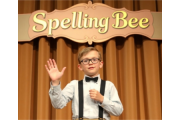Homer Steele, a Blandsville baseball great from times past, threw the ceremonial first pitch. His arm still has some strength, but his control had gone: his throw missed the catcher by a mile and the ball hit a man in the stands with a trayful of soft drinks, christening a number of fans with pop.
The game began with a strike on the Hunter batter and a complaint from Claude Crabbe; I don’t know why, because the batter had swung and missed. Maybe it was a protest on principle. I had two outs at first base, one by three steps, the other by more when the batter fell down halfway to the base. He reminded me of me. The Whales scored four runs in the bottom of the first.
Frustrated, Mr. Crabbe went hi-tech: he produced a megaphone so that every one could hear his criticisms of Ken. Hunter fans cheered, Whales fans booed. Between innings I conferred with Ken. “There’s nothing in the rule book prohibiting the use of a megaphone.”
“But there should be.” I said.
“I agree.”
As a gesture of good will, the Whales’ sponsor gave a free sample of fish and chips to any fan, official, player, or coach who wanted it. The Crabbes even accepted some, although not without some spirited debate, I noticed.
In the fourth inning, the megaphone emitted a series of screeches, crackles, and pops as it short-circuited, shocking Mr. Crabbe’s hand and causing him to drop it. The megaphone was dead. The crowd cheered.
By the end of the sixth inning, the Whales were ahead 13-3. In the seventh inning, a Whale hit a high pop-fly which came down three feet in front of home plate. The Hunters’ catcher tossed off his mask and settled under it, but instead of landing in his mitt, the ball bounced off his head, and by the time someone retrieved the ball, the well-coached batter was on second base. Mr. Crabbe shot onto the field like a stone from a sling-shot and, ignoring his catcher who was lying on the ground, groggy, he shouted at Ken : “That ball was foul ! You’re as blind as a bat !” The flying rodent or the piece of baseball equipment? I wondered.
Ken’s Job-like patience had finally reached its limit. “ One more word and you’re out of the game,” he said quietly.
“Yeah?”
“That’s a word.” And he ejected Crabbe.
I looked to see if Mrs. Crabbe would scream or cry. She did neither; instead, she put one hand over her mouth and raced to the nearest washroom. Was she sickened by Ken’s ejection of her husband? No, we learned later, she was allergic to certain kinds of fish and she had carelessly eaten some of the forbidden fruit of the sea.
Now we had two problems: first, the Crabbes might protest that their team was forced to finish the game without a coach; second, Mrs. Crabbe might accuse the Whales’ sponsor of trying to poison her. She solved the first issue by returning to the bench, although her only contribution to running the team consisted of moans and groans. We would deal with the second matter when and if we had to.
Meanwhile, Mr, Crabbe ensconced himself back of the screen behind the home plate and continued his tirade about the officiating. I called time-out. “Isn’t a manager or player ejected from the game supposed to leave the park?”
“Yes,” said Ken, “but we have no way of removing him except by physical violence.” The unofficial criticism of the umpiring continued.
The game ended at last, 19-5. As the Whales celebrated their victory with pizza, Coke, and Pepsi, Crabbe confronted Ken and challenged him to a fight, to which Ken replied with a perfect squelch, although perhaps only seniors like me could appreciate it: “If you were twenty years younger, I’d take you up on that.”
While everyone enjoyed the jubilation or endured the dejection, I walked slowly to second base, although no game was being played. So this is what it looks like from here, I thought. My curiosity was partly satisfied, but now I wondered about the view from third base.





